The definition here of a contemplative practice surprised me, as it is referred to as a skill. While most will see it as something to participate in, an action that’s not necessarily capable of someone describing it as being good at it or being bad at it, it’s highlighted in this blog post that it provides an increase in focus and comprehension qualities. When analyzing this statement myself, I realize the relationship between the distant facts in coursework and the everyday reality is woven with the threads of the learner’s perspective.
The reference to the living systems practice also reminded myself of another contemplative practice which stood out to me, exotic foods. Being a first generation American in Washington, I have experienced first-hand the view historical American generations have on food unfamiliar to them. I was raised on both sides of the coin, by my Egyptian family and the American society.

The heightened emotional response to these contemplative practices was affirmed and enhanced when I experienced a direct and intimate connection to course work. This involvement resulted in me stretching my hand out to reach for this intimate connection to course material I did not have a direct, familial connection with, to develop it instead.
It is this epiphany that I’ve concluded from this blog post. I want to agree with and applaud the description of contemplative practice being a skill of both emotional awareness and informational awareness. Without this skill, what are we really learning? I feel as if everybody can agree that facts and feelings rest gently on a sensitive scale, even if it doesn’t seem like it. The two, much like everything else in the world we share, are interconnected in a complicated, yet beautiful system.

